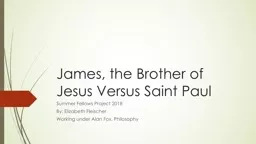PDF-David James Fielding: Curriculum Vitae
Author : stefany-barnette | Published Date : 2016-12-14
1 1 Personal Information Date of Birth 04 09 Nationality British New Zealand Education x2022 1984 87 Undergraduate Keble College Oxford x2022 1987 92 Graduate
Presentation Embed Code
Download Presentation
Download Presentation The PPT/PDF document "David James Fielding: Curriculum Vitae" is the property of its rightful owner. Permission is granted to download and print the materials on this website for personal, non-commercial use only, and to display it on your personal computer provided you do not modify the materials and that you retain all copyright notices contained in the materials. By downloading content from our website, you accept the terms of this agreement.
David James Fielding: Curriculum Vitae: Transcript
Download Rules Of Document
"David James Fielding: Curriculum Vitae"The content belongs to its owner. You may download and print it for personal use, without modification, and keep all copyright notices. By downloading, you agree to these terms.
Related Documents














